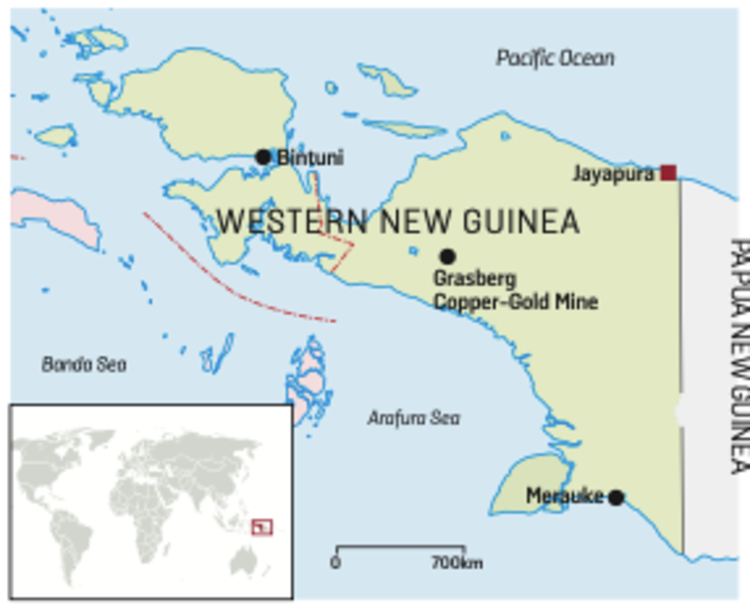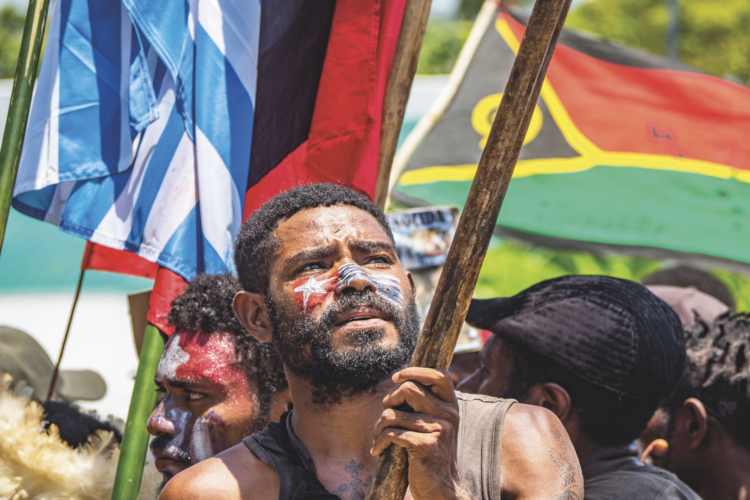
A new report links some of Britain’s biggest financial institutions and energy firms to deforestation, displacement and human rights abuses in Western New Guinea
By
In May, local human rights defenders reported a large-scale operation by the Indonesian military (TNI) targeting multiple villages in Intan Jaya Regency, Western New Guinea. Five civilians were killed and 900 villagers were forced to flee on foot through the forest. Since
2018, the UN estimates that escalating violence and human rights abuses – largely driven by the conflict between the TNI and the Free Papua Movement (OPM) – have displaced an estimated 60,000 to 100,000 Papuans. Now, a new report reveals the role of British companies in the ongoing human rights crisis.
Check out our related reads…
The report, published by the Centre for Climate Crime and Climate Justice (CCCCJ) at Queen Mary University of London (QMUL), details how British financial institutions, shareholders, oil companies and even the government are connected to environmental destruction in the region.
Western New Guinea – or West Papua, as it’s known to OPM – is home to the world’s third-largest rainforest (spanning 786,000 square kilometres across the entire island) after the Amazon and Congo rainforests.
This vast ecosystem faces an acute threat: between 1992 and 2019, the Indonesian government issued forest conversion licences for 15,700 square kilometres of forest – most of which is designated for oil palm plantations.

Adding to this pressure, the region is rich in natural gas – the Tangguh Liquefied Natural Gas (LNG) facility in Bintuni Bay is one of Indonesia’s largest gas projects – and contains some of the world’s most substantial reserves of gold, copper and nickel (a critical component for electric vehicle batteries).
In the Sudirman Mountain Range, the massive Grasberg mine – one of the largest gold and copper mines globally – generates billions of US dollars in annual revenue, a significant proportion of which flows directly into Jakarta.
While Indonesian business is the biggest benefactor of extractive industries in Western New Guinea, David Whyte, professor of climate justice at QMUL and director of the CCCCJ, says that British companies have significant connections to deforestation, mining operations and gas production projects in the region. Prudential, HSBC and Legal & General are explicitly named as backing palm oil companies that are driving the world’s largest ongoing deforestation project in Merauke.
Barclays, the Railways Pension Trustee Company and Royal London hold shares in Freeport- McMoRan, the operator of the Grasberg mine, which is known to discharge an estimated 300,000 tonnes of untreated waste into local rivers daily. British- Australian firm Rio Tinto also holds a sizeable stake in Grasberg, while BP operates and is the largest owner of the Tangguh LNG facility – a project that has displaced local villages, damaged mangrove forests and is estimated to generate more than 1.5 billion tonnes of carbon emissions over its lifetime.
The consequences of this UK-financed corporate activity are dire for Indigenous communities. The large-scale projects have led to land grabs and the destruction of traditional livelihoods, and are secured by a heavy security presence from the Indonesian military and police. ‘British companies and shareholders are not innocent bystanders,’ says Whyte.
‘They are profiting from a conflict that involves torture, extra-judicial killings and mass displacement. Until Papuans have control over their own resources, the cycle of repression and destruction will continue.’

Whyte says that there continues to be a very strong political movement for independence in West Papua – one that isn’t going away, despite Indonesian repression.
It’s not going to be an easy fight, he adds. The report concludes that by issuing an official statement in support of the sovereignty and territorial integrity of Indonesia – including the provinces of Papua and West Papua – and through arms exports and military training linked to the conflict, the British government is actively guaranteeing the repression and dispossession of the West New Guinean people. ‘The right to self-determination has been abused in West Papua, right from 1961, and the British government has gone along with that.’
Instead of this complicity, he argues, the British government should be taking several concrete steps: supporting the West Papuan people’s demand for a UN visit (which has been denied), severing all ties between the Ministry of Defence and the arms industry that could be used in West Papua, and actively intervening against the companies currently profiteering in the region.
Inaction, he points out, is unacceptable: ‘What’s really clear to us is that the West Papuan people’s struggle to defend not just their way of life, but their capacity to exist, is also intimately related to our own future,’ says Whyte. ‘Because if this rainforest is destroyed, it will be fundamentally damaging to all of us.’




